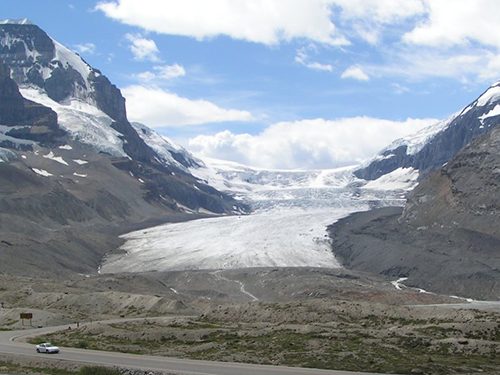This story includes details on the impacts of climate change that may be difficult for some readers. If you are feeling overwhelmed by this crisis situation here is a list of resources on how to cope with fears and feelings about the scope and pace of the climate crisis.
The world must stick to its most rigorous target for limiting climate warming to 1.5°C if it is to avoid the catastrophic thawing of ice sheets and glaciers, according to a report by the International Cryosphere Climate Initiative (ICCI).
ICCI, a group of scientists who study ice-covered parts of the world, says a rise as high as 2°C would melt most tropical and mid-latitude glaciers and set off long-term melting of the Greenland and Antarctic ice sheets, leading to 12 to 20 metres of sea level rise.
Quite how long this could take to happen is unclear. ICCI acknowledges that the worst effects might not be seen for centuries or even millennia. But, sooner or later, catastrophe would be inevitable, it insists.
All the countries which signed the 2015 Paris climate agreement undertook to hold global average temperature rises to “well below 2°C” over pre-industrial levels and to try to limit them to 1.5°C. But humanity’s still-rising greenhouse gas emissions have already caused almost 1.2°C of that warming and have put the world on course to exceed 3°C.
Now, more than 350 cryosphere scientists have signed an open letter calling on countries to commit to the 1.5°C limit at the COP28 climate summit, which opens November 30 in Dubai.
“From the cryosphere point of view, 1.5°C is not simply preferable to 2°C or higher. It is the only option,” Iceland’s Prime Minister Katrín Jakobsdóttir said in a statement.
“Earth’s regions of snow and ice are melting faster than we expected and already approaching tipping points,” added Prof. Jonathan Bamber of the University of Bristol, UK, who reviewed the ICCI report. “We need to put the brakes on, big time. Otherwise, we’re going to see irreversible changes in the polar regions that are going to have global consequences.”
In the past two years, the sea ice around Antarctica shrank to the smallest area ever recorded and there were exceptionally high temperatures at both poles. Swiss glaciers have lost 10% of their volume and a winter heatwave melted snow as high as 3,000 metres up in the Andes.
But 2°C of warming would be much worse, the report warns. The Arctic Ocean would be ice-free almost every summer. Annual carbon emissions from thawing permafrost would equal those of the European Union today. And absorption of atmospheric CO2 would permanently acidify polar seas and threaten key species including krill, salmon, and king crab.
The Himalayas would lose half of their ice, disrupting water supplies for agriculture and hydropower and raising the threat of floods caused by glacial meltwater breaking through a barrier of ice or rock. A study this year found that 15 million people are at risk from these glacial lake outburst floods, or GLOFs, mostly in India, Pakistan, Peru, and China.
“The lakes will start to get larger and larger,” says Tenzing Chogyal Sherpa at Nepal’s International Centre for Integrated Mountain Development (ICIMOD), whose home town of Namche Bazaar was damaged by an outburst flood in 1985. “They’ll be more and more hazardous, and once they get to a point, something can just trigger them, like a landslide.”
Far to the north, comparisons with aerial photographs dating back to the Second World War have shown that glaciers in Greenland are retreating twice as fast this century as they were in the 20th.
Keeping to 1.5°C now needs the world to reach net-zero emissions by 2034. Some scientists have argued 1.5°C is dead, although others point to the rapid uptake of solar and wind energy as reasons for continued hope.
“It could be that [above 1.5°C] is where we end up,” said Twila Moon of the University of Colorado Boulder, who helped to organize the scientists’ letter. “But I think talking ourselves out of rapid change now is selling ourselves short on what is possible because [of] cultural tipping points, social tipping points.”
From Prof. Bamber comes a sobering word of caution, however: even above 1.5°C, “every tenth of one degree counts.”










